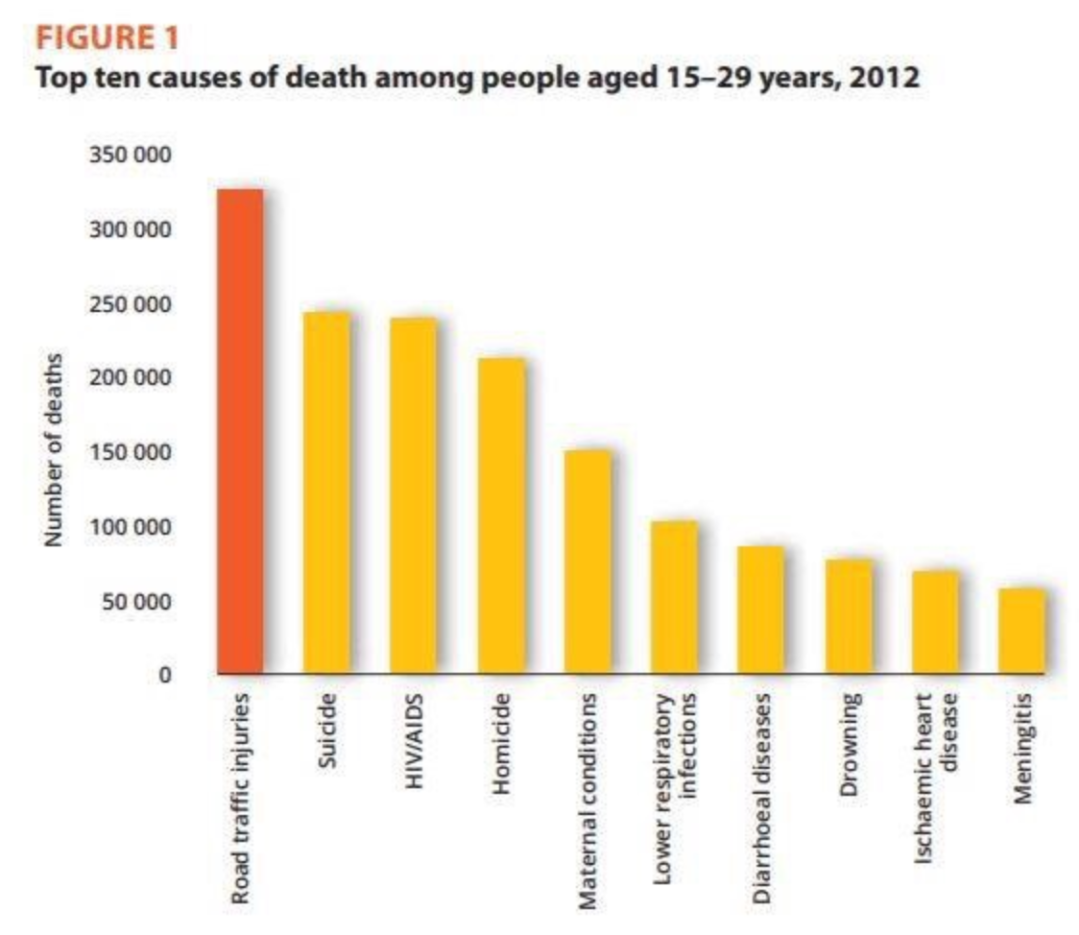
In light of the recent road accidents (https://bit.ly/2lGDeyy) in Nigeria, I would like to throw my two cents into the discourse. First off, my unreserved sympathy goes out to the families of the people that lost their lives or was injured during the gruesome accidents that have ravished our country in recent times. May their gentle souls rest in peace. Secondly, being a data junkie, I would like to give my thoughts on some WHO facts I stumbled upon, “The number one cause of death in 2012 for people aged between 15 and 29 is Road Traffic Injuries.” The image in the post shows the chart, and you can find the link to the report here – http://www.who.int/violence_injury_prevention/road_safety_status/2015/en/. Also, 8 out of the 10 countries with the highest road traffic death rate are in Africa, link – http://gamapserver.who.int/gho/interactive_charts/road_safety/road_traffic_deaths2/tablet/atlas.html.
As I reflect on the state of my continent and the definition of the word “accident,” I reached out to Wikipedia for help and this is definition I got: “An accident, also known as an unintentional injury, is an undesirable, incidental, and unplanned event that could have been prevented had circumstances leading up to the accident been recognized, and acted upon, prior to its occurrence.” I really love this definition, especially the second part: “that could have been prevented had circumstances leading up to the accident been recognized, and acted upon, prior to its occurrence.” I am a strong believer in preventive measures rather than reactive ones. Therefore, I am of the opinion that these accidents and road deaths in Africa can be prevented if we take the right measures.
Diving deep into the subject a bit more, I think our leaders in Africa are having a free pass due to the mindset of most of the masses. In Africa, the right people, process, infrastructure, sense of ownership, and repercussion system are not put in place yet. So should we just expect “avoidable accidents” not to happen? Due to the lack of willingness to take responsibility and do the right thing, people look for the easy way out – they play the “act of God” card. We blame God for the smallest of things or accept everything as fate. I then wonder why God gave us brains. Some spiritual leaders now give prophecies that make people accept their fates and hope that God will save them without any work on their part.
To come up with a solution rather than just stating the obvious, I would like to use the UK as a case study on how we can minimize avoidable road accidents. From the aforementioned research, you will see that Nigeria’s road traffic death rate is about 20 per every 100,000, while in the UK the rate is about 2.9 for every 100,000. The probability of these gruesome accidents happening in the UK is very low, and these are some of the reasons why:
1) People – For you to get a driver’s license in the UK, you have to pass two hectic exams (some people do this exam five times!). People give “testimonies” when they pass. In Nigeria, some people with our driver’s licenses have no business being outside mental health institutions, let alone driving a vehicle!
2) Infrastructure – Roads are built to last for decades, and almost every night maintenance workers are busy fixing potholes and updating road paint. Every car (except for brand new ones) are required by law to do a rigorous MOT yearly in order to ascertain if the vehicle is fit for the UK road. There is also a helpline and hard shoulders on most major roads, so people can call for help and pull over when needed. Technology is also available to track traffic offenders (speed meters, cameras, etc.).
3) Processes – When I read through the rules, road signs, lane discipline, roundabout sequence, hazard prevention, and what-if scenarios for driving in the UK, I then understood why “avoidable accidents” are rare; it’s like a Bible on its own! They use data to plan road capacity and usage to avoid traffic jams, overcrowding, etc.
4) A Sense of Ownership – The citizens believe they own the infrastructure and the country; and are committed to obeying the rules, calling the authorities for help, reporting bad behaviors, reporting bad roads, maintaining speed limits, etc. This is a big area where Nigerians need to step it up.
5) Repercussion System – Since getting a license is a big deal, people try to protect theirs. But if you decide not to, the authority will take it from you. For every major driving error, points are accumulated; at a certain aggregated score, your license will be revoked and you could be banned from driving and/or asked to write the hectic essay and take the practical test again. In some cases, you will go to jail immediately if you commit serious offenses.
All in all, I just poured my heart out to point out that we need to take ownership for our actions and also hold our government accountable. I think this can serve as a blueprint for solving “avoidable accidents” in different sectors. God bless you, God bless the Federal Republic of Nigeria, and God bless Africa. I would like to hear your thoughts. Ikenna Uzoh
Link and Chart sources: WHO, Punchng.
